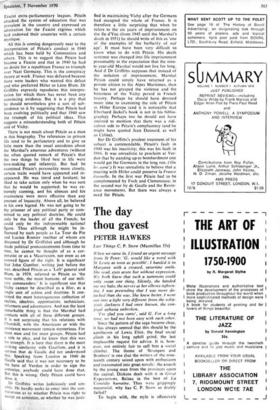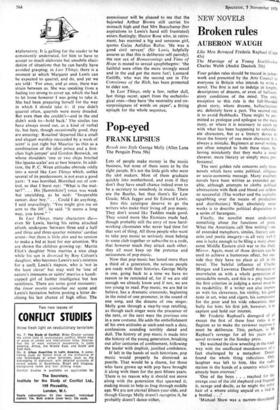The day thou gayest
PETER HAWKES
Last Things C. P. Snow (Macmillan 55s) When we came in. I found an urgent message from St Peter: 'G. would like a word with St Lewis as soon as possible'. I handed it to Margaret with a creased, saturnine smile. She read, eyes acute but without expression. We both knew that such a summons could only mean one thing. Silently, she handed me my halo, the nerves at her elbows tighten- ing. I was pretending that I was more de- tached than she was. She knew better. I went ow into a light very different from the solip- sistic darkness I had once known, the con- jugal aphasia unbroken.
'I'm glad you came', said G. For a long time, we had not been easy with each other.
Since the pattern of the saga became clear, it has always seemed that this should be the apotheosis of Lewis Eliot, the final social climb in his long uphill grind, the last implausible request for advice. It is, how- ever, not entirely fair to call him a social climber. The theme of 'Strangers and Brothers' is one that the writers of the nine- teenth century seized upon with enthusiasm and transmuted into great novels: the assault by the young man from the provinces upon the capital. Dickens dealt with it in Great Expectations, Balzac in the best of La Comedic hurnaine. They were grippingly successful; why has C. P. Snow so drably failed?
To begin with, the style is offensively explanatory. It is galling for the reader to be consistently underrated, for him to have to accept so much elaborate but unsubde elucis dation of situations that he can hardly have avoided grasping; in Last Things, there is a moment at which Margaret and Lewis can be expected to quarrel, and do, and yet we are told: For once, and at once, there was strain between us. She was speaking from a feeling too strong to cover up, which she had to let loose however I was going to take it. She had been preparing herself for the way in which I should take it: if you didn't quarrel often, quarrels were more dreaded. But even then she couldn't—and in the end didn't wish to—hold back.' The similes too have always stood out, as a kind of verbal tic, but here, though occasionally good, they are amazing: Rosalind 'departed like a small and elegant warship succeeded by a wash of scent' is just right but Maurice 'as thin as a combination of the idiot prince and a first- class high-jumper' and Gordon Bestwick, on whose shoulders 'one or two chips bristled like iguana scales' are at best bizarre. In addi- tion, the P. C. Wren attitudes obtrude oddly into a novel like Last Things which, unlike several of its predecessors, is not even a good yarn: 'I was horrified. Horrified out of con- trol, so that I burst out: "What is the mat- ter?". . . His [Sammikinsi voice was weak but unyielding, as he said : "Inoperable cancer, dear boy.". . . Could I do anything, I said unavailingly. "You might give me an arm to the lift", he said. "It seems a long way, you know." ' In Last Things, many characters die— even Sir Lewis, having his retina attached afresh, undergoes 'between three and a half and three and three-quarter minutes' cardiac arrest—but there is little plot and no tension to make a bid at least for our attention. We are shown the children growing up: Martin Eliot's daughter Nina marries a nice chap while his son is divorced by Roy Calvert's daughter, who becomes Lewis's son's mistress for a spell; Lewis's stepson, who is 'not in the least clever' but may well be 'one of nature's innocents or saints' marries a handi- capped girl of feebler intelligence but less saintliness. There are some good moments: the timor mortis conturbat me scene and Lewis's hesitation before posting a letter de- clining his last chance of high office. The connoisseur will be pleased to see that the bejowled Arthur Brown still carries his stomach high and that Mrs Beauchamp (her aspirations to Lewis's hand still frustrated) enters fleetingly; Hector Rose who, in retire- ment, has married a bi; and sensuous girl, quotes Gaius Aufidius Rufus. 'He was a good civil servant' (Sir Lewis helpfully assures us that this is deliberate self-parody); the raw sex of Homecomings and Time of Hope is muted to sexual apophthegms: 'the faithful were often the more strongly sexed and in the end got the more fun'; Leonard Getliffe, who was the second son in The Conscience of the Rich, has been promoted to elder son.
In Last Things, only a few, rather dull, last things occur, apart from the eschatolo+ gical ones—they have 'the neutrality and un- surprisingness of words on paper', a fitting epitaph for the whole sequence,























































 Previous page
Previous page